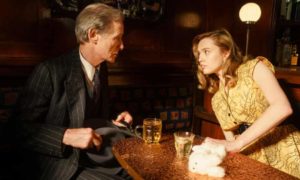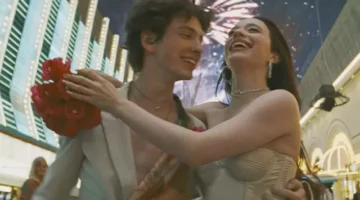Tropic Sprockets / Living
By Ian Brockway
 Oliver Hermanus (Moffie) directs “Living,” a handsome adaptation of “Ikiru” by Akira Kurosawa. For showtimes check Tropiccinema.com.] This film is a refreshing stylistic throwback to the character dramas of the 1960s. The film engages and beguiles, step by step.
Oliver Hermanus (Moffie) directs “Living,” a handsome adaptation of “Ikiru” by Akira Kurosawa. For showtimes check Tropiccinema.com.] This film is a refreshing stylistic throwback to the character dramas of the 1960s. The film engages and beguiles, step by step.
Mr. Williams (Bill Nighy) is a mild mannered official in the Public Works office. He is shy and reserved, hardly speaking. His wife has long passed and Williams lives with his son. Day after day moves forward with unfailing routine and regularity. The possibility of revealing any emotion oppresses him. His peers flutter around him like drones.
One day Williams goes to his physician and receives sobering news.
He resolves to brush it off and go to a night club with the rakish Sutherland (Tom Burke). Though he likes it, Williams finds the frenzied activity oppressive and goes home. He is racked with guilt over not telling his family the news of his personal health.
Williams resolves to take off from work. During a stroll, he meets the introspective and bright Miss Harris (Aimee Lou Wood) a former Public Works employee from his department. An acquaintanceship starts initiated by small talk.
The film highlights the poetry of facial gestures. Mr. Williams’ tense half-smile reveals adventures that were longed for and half experienced. He walks with a measured tread. Only in his interaction with the young Miss Harris does Williams open up and even so, it takes a lot for him to appear at ease and give of himself.
This is a kind of “Lost in Translation” film without the sexual tension set in a dreary England that mirrors Williams’ drear and melancholy. The sky is gray and the cobblestones are slicked over, black and shiny with rain.
Like a character in a Ray Bradbury tale, Williams longs for his childhood. One of his projects is an effort to revive a children’s park. One gets the feeling that the aged Williams wants to play catch with his boyhood ghost.
The riddle of the film is that it remains unclear as to why Williams is so laconic and inward. We know little of his loves or his past life.
This makes Williams all the more poignant. In his meetings with Miss Harris, one clearly sees the young man Williams within the old one. Like a character in The Twilight Zone classic “Kick the Can,” Williams achieves a union with his childhood self.
“Living” is understated, empathetic and deeply satisfying showing Bill Nighy at the top of his game.
Write Ian at [email protected]
[livemarket market_name="KONK Life LiveMarket" limit=3 category=“” show_signup=0 show_more=0]





No Comment